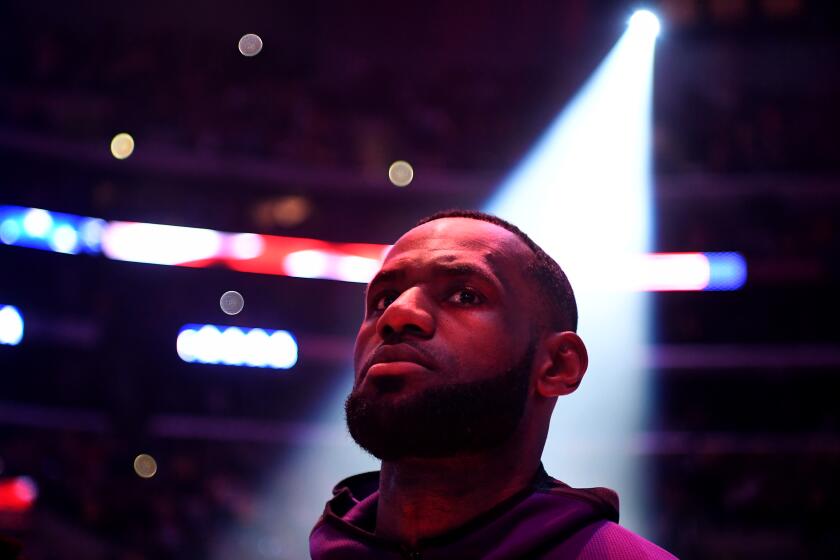Composure counts after defeat
- Share via
Poker always seems to be changing, which demands dealing with the evolving trends. But still, one of the toughest challenges remains handling the psychological aspect of an opponent’s showing you a bluff.
In today’s hand from the World Poker Tour’s $15,000-buy-in Doyle Brunson Five Diamond World Poker Classic at Las Vegas’ Bellagio in 2009, with blinds at $1,200-$2,400 plus a $400 ante, longtime pro Kenna James opened for $6,500 with A-9 offsuit in the cutoff seat. The big blind, with a stack of about $110,000 compared with James’ $305,000, called.
The flop came 10-9-5, rainbow, giving James middle pair. The big blind led out for $10,000.
“It tells me he either has a hand like 10-J or he’s searching to see how strong I am, because I opened in late position and I could have anything,” said James, a pro from the Poker Host online site.
“Even if he thinks I’m strong, he might think he’s taking away the pot from A-K or A-Q. So I already know what I need to do to put him in an uncomfortable spot, plus I also might have the best hand. I make it $45,000 to go.
“I chose that amount based on his stack. He started the hand with about $110,000. For him to call from out of position for half his chips is almost impossible. He’s got to have either a monster to call, or make the commitment and move all in, which would be pretty hard for him to do if he had no hand.”
After a couple of minutes, James’ opponent moved in. James faced a call of about $60,000.
“I wanted to define his hand and execute what I had in mind,” James said. “When he moves all in for all his chips, the worst hand I put him on in that spot is Q-J for an open-ended straight draw. That’s the worst hand I give him that I can beat. That would give him two overs and an open-ender, which gives him 14 outs.
“Now I hated my spot because I was thinking he had a hand like 10-J. I have five outs — the remaining aces and 9s. It just didn’t seem like a good call. So I folded.”
And his opponent turned over Q-7 offsuit.
“That’s the kind of competition you’re out here facing,” James said, “and then they’ll show it, and the reason is to knock you off your game. It’s not just the loss of the hand, but how you deal with the loss. Can you suck it up and move on instead of bluffing off chips?
“I already knew that emotionally inside I was screwed. So I had to exude patience. Think of a patient in a dentist’s chair. That’s what it’s like. OK, you hit a nerve. Go ahead and drill. The next hand I played was A-K, but it was three laps later. I had my composure back.”
Table talk
Overs: Overcards; in this case, hole cards higher in rank than the board cards.
More to Read
Go beyond the scoreboard
Get the latest on L.A.'s teams in the daily Sports Report newsletter.
You may occasionally receive promotional content from the Los Angeles Times.








